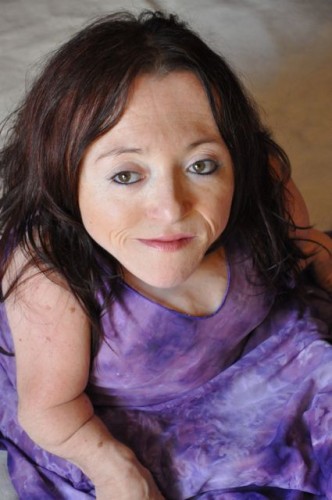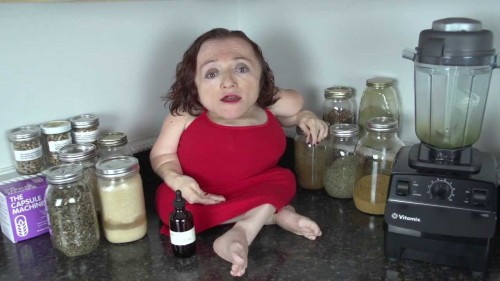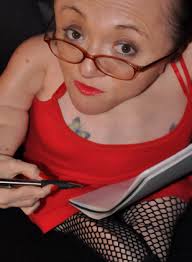[The following is a guest post by Courtney Weber. Courtney Weber is a Wiccan Priestess, writer, Tarot Adviser, and teacher living in New York City. She runs open events in Manhattan and teaches workshops on Witchcraft from coast to coast.]

Jane Hash
In a scene from her movie, Jane Hash is dressed as a Roman Emperor with two men in goat costumes hitched to her wheelchair, converting it to a modern chariot. She lashes them with a homemade whip as they pull her through the festival grounds.
“They were representing Pan,” Jane explained in a Skype interview. “It seemed like a good idea to harness Pan! So I did. “
Taming a Wild God from the seat of her wheelchair is perfect euphemism for Jane Hash’s life. She may be small, but she is one of the biggest badasses you’ve (possibly) never heard of.
Jane was born with 26 broken bones and the doctors expected she would live a few hours at most. By high school, she had broken 200. Today, this three-foot tall woman is a fixture at Pagan gatherings and well-known in her home state of Ohio as the self-described “Politically incorrect voice for the unheard.” This spring, Jane released her self-produced film about life with Osteogenesis Imperfecta, aka “Brittle Bones Disease.” Jane’s bones so easily break that when a penny was dropped on her head, she suffered a skull fracture. The condition keeps her confined to a wheelchair and requires full-time home aid. That alone might warrant enough curiosity for a film, but Jane doesn’t stop at life-on-wheels. In a tight 71-minutes, Plain Jane: The Shockumentary draws viewers into the unique challenges Jane navigates as part of her standard routine, but also openly into a world many might call alternative; including her polyamorous relationships and Pagan practices.
Regarding the decision to make the film, Jane said:
“My whole life, people have said, ‘Oh, you’re so inspiring!’ I didn’t understand that for a long time. ‘Inspiring’ is kind of a dirty word in the Disability Community and I get that. But when it’s used in proper context, I think it’s acceptable. As I got older, I realized that a lot of these people said I inspired them not because I was doing mundane things like buying a loaf of bread. There’s nothing inspirational about that. But when I’m dancing around a bonfire naked under a full moon with 2,000 other people, and someone says, ‘Wow, I’ve always been afraid to do that, but you inspired me to do it and now I’m happy!’ and I’m thinking, ‘Wow. I wasn’t really trying to inspire anybody, I’m just down for the party!’ I thought if I put some intention behind it and tried to inspire people to let go of what they’re afraid of, I can help more people find happiness.”
At the opening of the film, Jane explains her philosophy that obstacles are illusions created by fear. “Fear seems to be the number-one thing that stands in the way of peoples’ happiness, whether they’re afraid to try new things or whether they’re afraid to be themselves.”
The film’s mission is described as a tool to help other find self-acceptance. Many of its subjects could stand alone, but Jane not only weaves them together logically, but hilariously. She even takes the viewers into some deeply personal parts of her life, including intimate moments with lovers or getting tattooed and pierced. Shocked or not by Jane and her life, you’re sure to find yourself laughing, even in the tougher moments detailing her experiences with child abuse and alcoholism. Jane evokes dark humor in a “Dramatic Recreation” of her younger self which included having an aide drive her to the liquor store, and then ordering the aide to mix a drink in the car since she couldn’t wait through a ten-minute drive home.
“(Humor) was my goal. There were a lot of uncomfortable topics that needed to be addressed, but I wanted to find a way to get that information out there and educate them without them realizing it.”
Jane’s movie doesn’t only follow her search for aides accepting of her lifestyle and willing to travel with her to festivals and drum circles (although the scene describing their interview process is one of the juicier gems), Jane exposes viewers to a much bigger fight—that of Disability Rights. One scene shows Jane sitting outside a corporate building holding a sign that says, (Lawfirm) Refuses To Help Disabled Woman. A clerk in the firm had refused to give Jane a receipt of debt payment, which she needed for the purchase of a house—a debt that a previously trusted person laid on Jane’s credit card. The receipt was necessary for the mortgage and the window to purchase was closing.

Jane Hash
“The lady said, ‘Since it took you two years to pay this back, you can just wait for the receipt until I feel like giving it to you.’ I took a deep breath and I let them know that we could do this the hard way or the easy way. But either way, I was getting my receipt that day. She laughed at me and I said, ‘Okay! I guess we’re going to do it the hard way.’ I was prepared. I went outside and had somebody bring me the signs that I had already made. In less than ten minutes, the main attorney in the place got in my face and said, ‘What are you doing? This is my law firm!’ I said, ‘Your law firm is run by a bunch of bullies and I’m not leaving without my receipt.’ By then a crowd had gathered. Two guys asked me, ‘Want me to start cracking heads?’ and I said, ‘No. Not today. Let’s just see how it goes.’ And…I got my receipt that day.”
“I always have to be ready for battle,” Jane said. “It doesn’t matter if it’s some crackhead on the street or some corporate jerk. When people look at me they think, ‘Ooh! Easy target! She’s tiny, what’s she going to do?’ It irritates the crap out of you.”
Jane is not above breaking the law when it comes to fighting her battles. A few years ago, a malfunction in the Ohio Medicaid system deleted Jane from their system. After taking the protocol steps to fix the problem, when her caregivers were still not getting paid, Jane went to a busy section of downtown Kent with an empty coffee can and a sign that said, Bail Out My Home Health Aides.
“Eventually a police officer asked me if I was aware that panhandling without a permit was against the law. I was aware. I had researched and found a nonviolent law that I could break to get attention and I told him, ‘I’m just going to sit here until something happens to fix the situation.’ The cop was great. He offered some great advice, which I followed. I also launched a huge email and phone call campaign to the higher ups at Medicaid. Hundreds of people wrote letters, emails, made phone calls. The situation got fixed, but it’s really unfortunate that I had to go that far. I’m one of the few people it affected who can speak out. Many of them are children, or elderly, or disabled to the point that they can’t communicate.”

Jane Hash
Jane is currently fighting state laws regarding her ability to work and still receive Medicaid benefits. In Plain Jane, Jane points out that those who born with severe disability are placed under enormous restrictions. Under the current situation, Jane has the choice between remaining fully dependent on the system or paying all of her own costs out of pocket. Costs for Jane’s home health aides and other needs total over $100,000 per year. But current work-transition programs available to Jane take away benefits faster than workers can replace them, or only offer jobs with partner companies like Walmart. In our interview, Jane mentioned that she could likely get a job as a Walmart greeter and still receive benefits, but with enough certifications in holistic healing practices to wallpaper her house, she has no interest in doing so. Jane’s goal is to run her own business.
“(People like me) have to either live in poverty or find this fantasy job that pays $100,000 per year right off the bat. That’s not realistic. There are no sensible in-between steps to gradually get you off the system. There needs to be a sensible program in place to help disabled people go from poverty to self-sufficiency without missing out on critical services. Taking away twice as much as a person is making is not conducive to self-sufficiency. I would have no problem having my benefits taken away and then me pay into the system for them, just like regular people paying for their health insurance. I don’t need or want everything given to me. I have to be given the opportunity to work and do what it is that I do.”
Plain Jane: The Shockumentary is one step in Jane’s fight to address the gap in self-sufficiency. She is also talking to the media and blogging about it at Adventures of the Gimp Avenger. Jane is seeking out colleagues, particularly those in other countries with working programs that address this issue. In the U.S.A., Jane advocates people reaching out to Governor Kasich whether by phone or email to mention that legislative roadblocks are preventing people with disabilities like Jane from being gainfully employed need to be removed. As a suggested script, Jane suggests mentions that “Between the Governor’s Office of Health Transformation and the Governor’s Council on People with Disabilities, they should be able to develop a sensible plan that would provide disabled Ohio citizens the opportunity to obtain gainful employment without any risk of losing medically necessary support services.”
Now that her film is complete, Jane is moving onto other endeavors. She recently founded a nonprofit called Classy Little Fashions that utilizes community resources to make age-appropriate clothing accessible to men and women with non-standard body types. Jane points out that she’s “basically the size of an obese three-year old.” The clothes that fit her height-wise, do not fit her woman’s form. This project helps find age-appropriate clothing for people like Jane. She is also looking forward to the November election this November because there’s a chance that medical marijuana will be legalized in Ohio. Jane also has a connective tissue disorder, which can be treated with fresh-grown cannabis. “You don’t get high from it,” she said. “It’s just like juicing kale or an apple. (Getting high) is not what I’m after. I want fresh, organic, non-genetically modified cannabis to put in my smoothie.”
To other activists, Jane encourages keeping fun in life. Without fun, she says, burnout is all too easy. She credits her Pagan practices in helping her stay grounded and continuing to fight her fight. “I think my spirituality allows me to see things more clearly and get caught up in trivial things. I think not having a lot of the hang-ups that come with a lot of religions helps me focus on the real issue at hand. It makes me feel less judgmental. As soon as I embraced Paganism, my life got better and better.”
“I really don’t think it is my responsibility to make people like me. You’re either going to like me or you’re not. It’s my responsibility to be the best person I can be.”
Plain Jane: The Shockumentary is available for rent or purchase at vimeo.com or at http://plainjanetheshockumentary.blogspot.com/.
The Wild Hunt is not responsible for links to external content.
To join a conversation on this post:
Visit our The Wild Hunt subreddit! Point your favorite browser to https://www.reddit.com/r/The_Wild_Hunt_News/, then click “JOIN”. Make sure to click the bell, too, to be notified of new articles posted to our subreddit.
Really interesting! Thanks for the link. I’m a disabled Pagan in the UK campaigning for better disability access to Pagan events. I have an article on the subject in the upcoming Lammas edition of Pagan Dawn magazine.
– Naomi Jacobs
Why do articles by guest contributors not include the author’s name? I want to know who I am reading.
It says right at the beginning of the article whom it was written by.
Of course! Sorry about that, I was looking at the byline.
This looks really interesting! I’ll be sure to check it out!